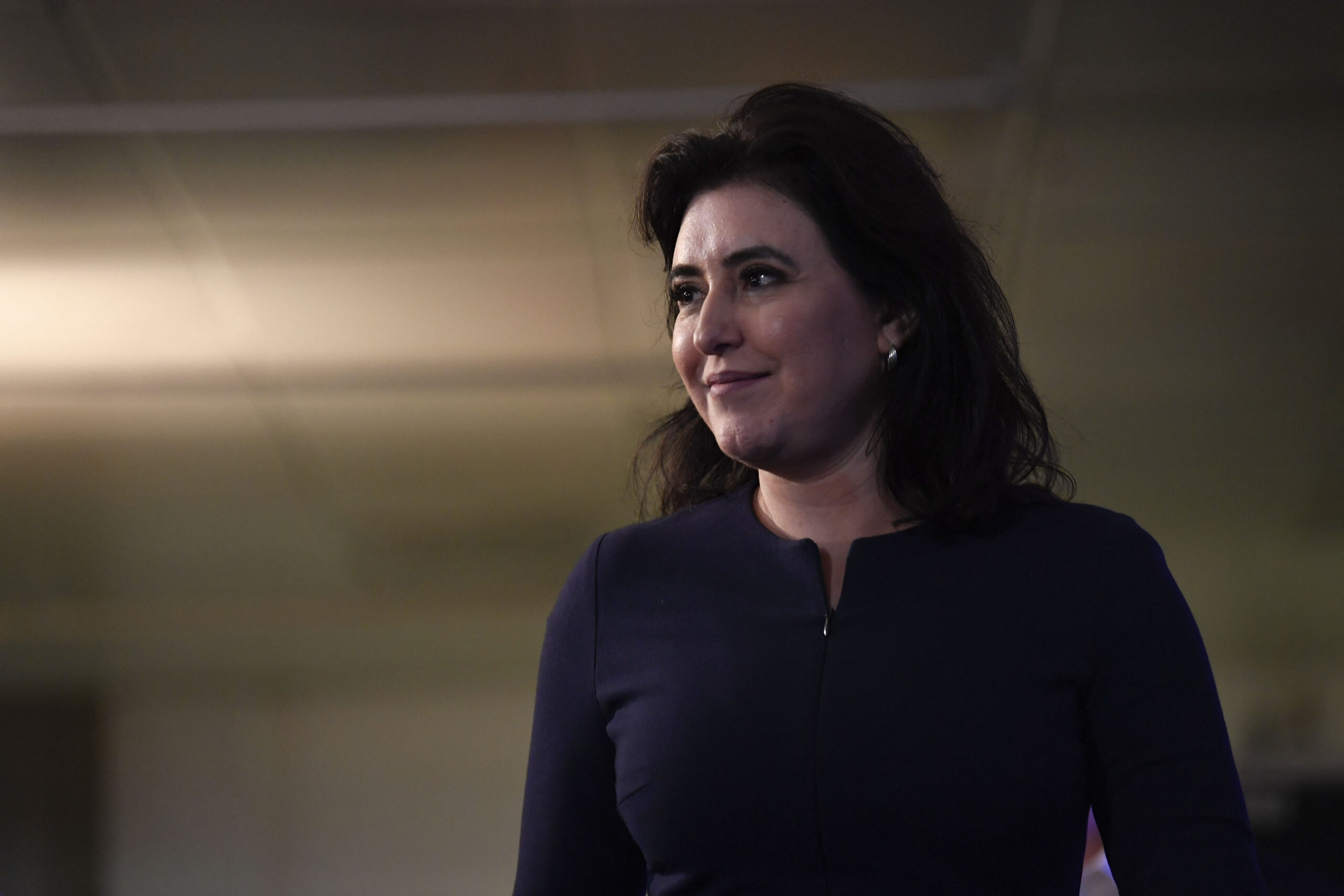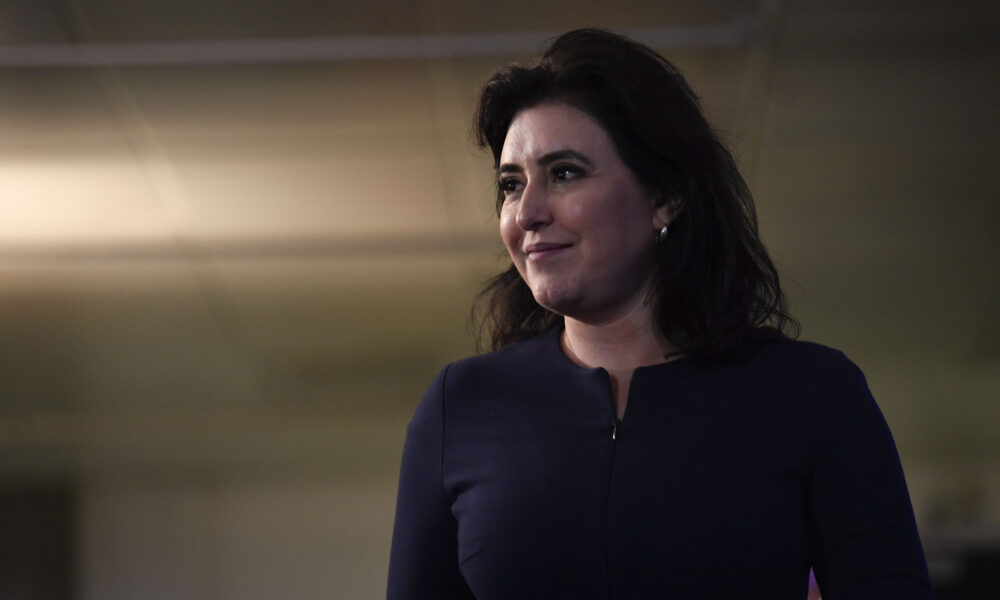International
Meet the feisty woman kingmaker in Brazil’s presidential runoff

AFP | Marcelo Silva De Sousa
A feisty and little-known woman senator has emerged as kingmaker in Brazil’s very close presidential runoff.
Many Brazilians saw Simone Tebet, a lawyer and university professor, for the first time when she took stage the night of August 29 for the campaign’s first televised debate, standing alongside rightwing President Jair Bolsonaro and leftist icon and ex-president Luiz Inacio Lula da Silva.
And in a surprise, Tebet made a strong impression.
When Bolsonaro at one point insulted a woman journalist asking questions at the debate, the senator leapt to her defense, pointing at the president with her index finger and saying in a firm voice: “I am not afraid of him.”
Tebet, 52, finished third in the first round voting with four percent of the votes, far behind Lula, who took 48 percent, and Bolsonaro with 43 percent.
But her share of the pie amounts to 4.9 million votes — and the difference between the two frontrunners was 6.1 million.
Instantly, Tebet became the candidate to woo. And she endorsed Lula.
‘Third option’
Tebet’s candidacy was organized by centrist parties and supported by part of the Brazilian establishment as a way to temper the polarization generated by the far-right president Bolsonaro and the leftist hero of the working class and poor, Lula, of the Workers Party.
Tebet is from the city of Tres Lagoas, which has a population of 125,000, and she was its mayor from 2005 to 2010. It is in the west-central state of Mato Grosso do Sul, where the economy is based on agribusiness.
Tebet is married to a politician from her state and they have two daughters. She is Catholic and describes herself as feminist.
Tebet played a prominent role on a congressional committee that in 2021 investigated the government’s handling of the coronavirus pandemic. And while on this panel, she clashed loudly with Bolsonaro allies.
Tebet was also the first woman to preside over the Brazilian senate’s Constitution and Justice Committee, considered the chamber’s most important panel.
But her biggest jump to notoriety came with her presidential candidacy, which was promoted as a third way between the right and left.
Tebet managed “to fill a lagoon that was empty,” said Marco Antonio Teixeira, a professor of political science at the Getulio Vargas Foundation in Sao Paulo.
She succeeded because “she billed herself as an actual third option, strong in her criticisms of Bolsonaro and of the Workers Party in a balanced way, not simply seeking confrontation,” said Teixeira.
In the presidential debates, she challenged Bolsonaro and urged him to show respect for women; the president has a penchant for making remarks seen as sexist.
This helped Tebet grab third place from center-left candidate Ciro Gomes, who polls had predicted would take that spot.
Conservative and close to agribusiness
Up through the midway point of Bolsonaro’s term, Tebet supported his government in 86 percent of the votes taken in the Senate, including one that extended gun-carrying rights to land outside rural properties, according to investigative news outlet Agencia Publica.
Tebet owns three rural estates, one of which sits on land claimed by Indigenous people in Mato Grosso do Sul.
She broke with Bolsonaro after she joined the congressional commission that probed the pandemic, which killed more than 680,000 people in Brazil.
During the campaign for the first round of presidential voting, Tebet promised to bring transparency to huge amounts of money administered by Congress, boost spending on science and technology, and provide scholarships for students at the intermediate level of education to head off school dropouts.
Now, as analysts say Lula has to veer toward the center to win new supporters, Tebet — who has said Brazil is conservative and not ready, say, to legalize abortion — is an important person to have on your side.
Last week, she formally endorsed Lula in the runoff on October 30, while denying that this gesture meant she has given up on creating a third path in Brazilian politics.
Tebet’s party, however, called the Brazilian Democratic Movement, chose to remain neutral in the race between Bolsonaro and Lula.
“What is at stake is bigger than each of us,” she said.
Tebet said she would vote for Lula because of his “commitment to democracy and the constitution,” which she said she does not see in Bolsonaro.
But she criticized Lula, credited with bringing millions of people out of poverty during his rule from 2003 to 2010, for not really “looking in the rear view mirror” and making new proposals for how he would govern if he regains power.
“Tebet has a way of speaking with agribusiness and women that is much more direct than Lula,” said Teixeira.
She can lure for Lula centrist voters tired of the tensions born of Bolsonaro-Lula polarization, he added.
Brazilian press reports have suggested Tebet could become a minister in Lula’s government if he wins. Tebet has denied being interested in such a job.
International
U.S. Senate Rejects Budget, Bringing Government Closer to Shutdown Amid DHS Dispute

The U.S. Senate voted on Thursday against a budget proposal in a move aimed at pressuring changes at the Department of Homeland Security (DHS), following the killing of two civilians during a deployment of immigration agents in Minneapolis.
All Senate Democrats and seven Republican lawmakers voted against the bill, which requires 60 votes to advance, pushing the country closer to a partial government shutdown that would cut funding for several agencies, including the Pentagon and the Department of Health.
The rejection came as Senate leaders and the White House continue negotiations on a separate funding package for DHS that would allow reforms to the agency. Proposed measures include banning Immigration and Customs Enforcement (ICE) agents from wearing face coverings and requiring them to use body-worn cameras during operations.
The vote took place just hours after President Donald Trump said he was “close” to reaching an agreement with Democrats and did not believe the federal government would face another shutdown, following last year’s record stoppage.
“I don’t think the Democrats want a shutdown either, so we’ll work in a bipartisan way to avoid it. Hopefully, there will be no government shutdown. We’re working on that right now,” Trump said during a Cabinet meeting at the White House.
International
Trump Says Putin Agreed to One-Week Halt in Attacks on Ukraine Amid Extreme Cold

U.S. President Donald Trump said on Thursday that he secured a commitment from Russian President Vladimir Putinto halt attacks against Ukraine for one week, citing extreme weather conditions affecting the region.
“Because of the extreme cold (…) I personally asked Putin not to attack Kyiv or other cities and towns for a week. And he agreed. He was very pleasant,” Trump said during a Cabinet meeting broadcast by the White House.
Trump acknowledged that several advisers had questioned the decision to make the call.
“A lot of people told me not to waste the call because they wouldn’t agree. And he accepted. And we’re very happy they did, because they don’t need missiles hitting their towns and cities,” the president said.
According to Trump, Ukrainian authorities reacted with surprise to the announcement but welcomed the possibility of a temporary ceasefire.
“It’s extraordinarily cold, record cold (…) They say they’ve never experienced cold like this,” he added.
Ukrainian President Volodymyr Zelensky later commented on the announcement, expressing hope that the agreement would be honored.
International
Storm Kristin Kills Five in Portugal, Leaves Nearly 500,000 Without Power

Storm Kristin, which battered Portugal with heavy rain and strong winds early Wednesday, has left at least five people dead, while nearly half a million residents remained without electricity as of Thursday, according to updated figures from authorities.
The revised death toll was confirmed to AFP by a spokesperson for the National Emergency and Civil Protection Authority (ANPEC). On Wednesday, the agency had reported four fatalities.
Meanwhile, E-Redes, the country’s electricity distribution network operator, said that around 450,000 customers were still without power, particularly in central Portugal.
Emergency services responded to approximately 1,500 incidents between midnight and 8:00 a.m. local time on Wednesday, as the storm caused widespread disruptions.
The Portuguese government described Kristin as an “extreme weather event” that inflicted significant damage across several regions of the country. At the height of the storm, as many as 850,000 households and institutions lost electricity during the early hours of Wednesday.
Several municipalities ordered the closure of schools, many of which remained shut on Thursday due to ongoing adverse conditions.
Ricardo Costa, regional deputy commander of the Leiria Fire Brigade, said residents continue to seek assistance as rainfall persists.
“Even though the rain is not extremely intense, it is causing extensive damage to homes,” he noted.
In Figueira da Foz, a coastal city in central Portugal, strong winds toppled a giant Ferris wheel, underscoring the severity of the storm.
-

 Central America3 days ago
Central America3 days agoGuatemala seizes over a ton of cocaine hidden in flour at Pacific port
-

 International5 days ago
International5 days agoDelcy Rodríguez seeks political agreements after Maduro’s ouster
-

 International3 days ago
International3 days agoHistoric snowstorm paralyzes Toronto after 60 centimeters of snow
-

 International3 days ago
International3 days agoSpain’s irregular migrant population rises to 840,000, study finds
-

 Central America2 days ago
Central America2 days agoGuatemala Police Arrest Prison Guard Caught in the Act of Extortion
-

 Central America2 days ago
Central America2 days agoHonduras swears in conservative president Asfura after disputed election
-

 International5 days ago
International5 days agoFederal immigration agents kill man in Minneapolis, sparking protests and outrage
-

 International1 day ago
International1 day agoFootball Fan Killed in Clashes After Colombian League Match
-

 Central America2 days ago
Central America2 days agoBukele leads public trust rankings as UCA survey highlights gains in security
-

 International2 days ago
International2 days agoWinter Storm Fern Leaves 30 Dead and Over One Million Without Power Across the U.S.
-

 International2 days ago
International2 days agoDoomsday clock moves to 85 seconds before midnight amid rising global risks
-

 Sin categoría2 days ago
Sin categoría2 days agoEight Killed in Series of Armed Attacks in Ecuador’s Manabí Province
-

 International3 days ago
International3 days agoRights group says nearly 6,000 killed in Iran protest crackdown
-

 International1 day ago
International1 day agoMissing Spanish Sailor Rescued After 11 Days Adrift in Mediterranean
-

 International1 day ago
International1 day agoRubio Says U.S. Could Participate in Follow-Up Russia-Ukraine Talks
-

 Central America1 day ago
Central America1 day agoGuatemala President Says Starlink Terminal Found Inside Prison
-

 International2 days ago
International2 days agoSpain approves plan to regularize up to 500,000 migrants in Historic Shift
-

 Sin categoría2 days ago
Sin categoría2 days agoEl Salvador Launches Fourth Year of Ocean Mission to Protect Marine Ecosystems
-

 International3 days ago
International3 days agoVenezuela frees at least 80 political prisoners, NGO says
-

 International3 days ago
International3 days agoEU launches new probe into X over AI-generated fake nude images
-

 International3 days ago
International3 days agoFrance debates ban on social media for children under 15
-

 International3 days ago
International3 days agoSevere winter storm grips U.S., leaves multiple dead as extreme cold persists
-

 International5 hours ago
International5 hours agoU.S. Senate Rejects Budget, Bringing Government Closer to Shutdown Amid DHS Dispute
-

 International5 hours ago
International5 hours agoMan Arrested After Vehicle Crashes Into Jewish Institution in Brooklyn
-

 International5 hours ago
International5 hours agoStorm Kristin Kills Five in Portugal, Leaves Nearly 500,000 Without Power
-

 International5 hours ago
International5 hours agoTrump Says Putin Agreed to One-Week Halt in Attacks on Ukraine Amid Extreme Cold




























